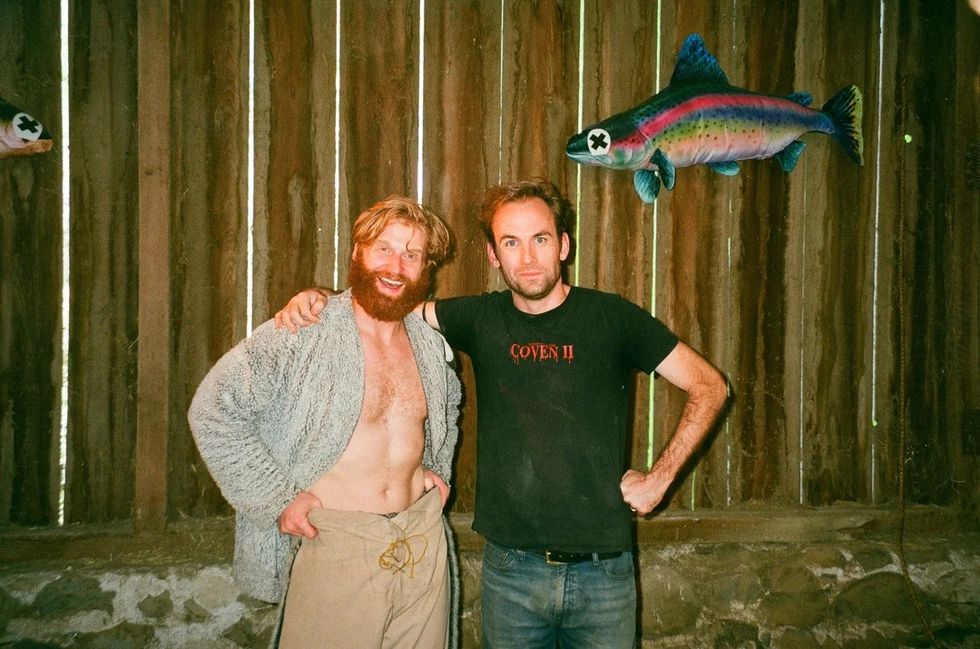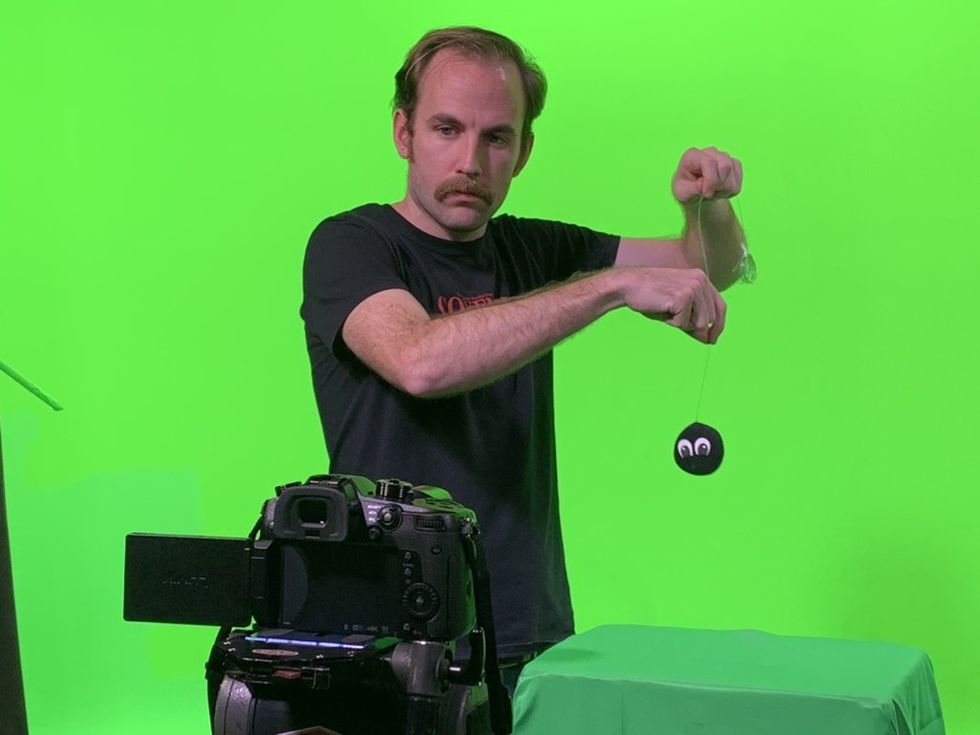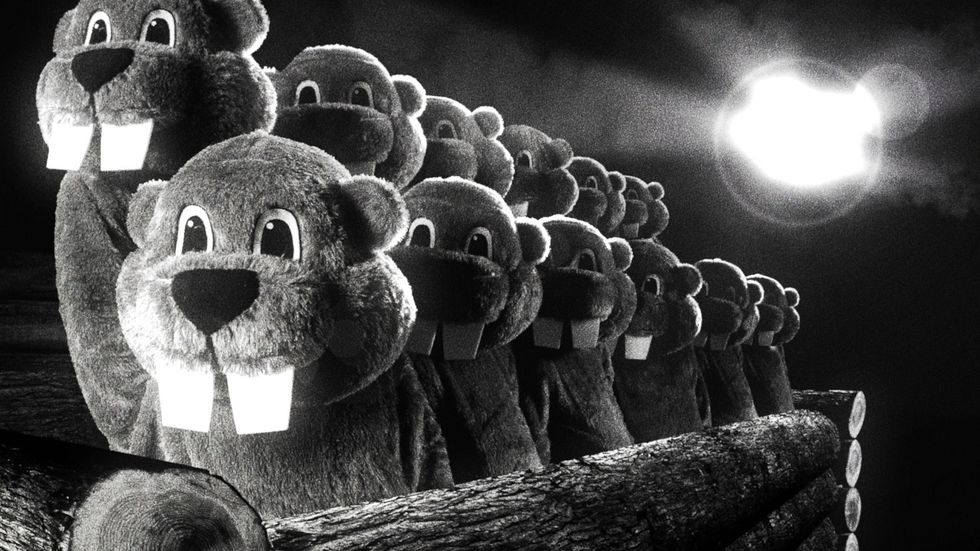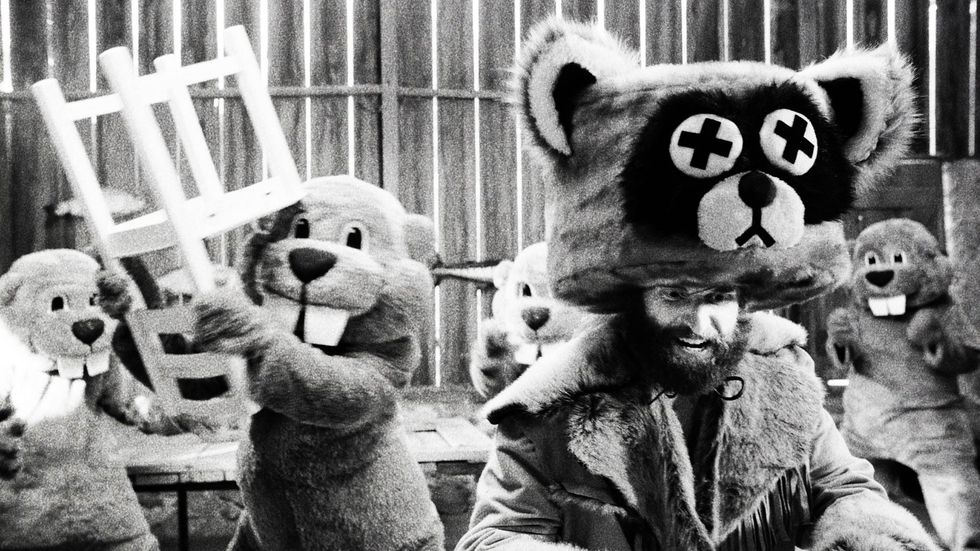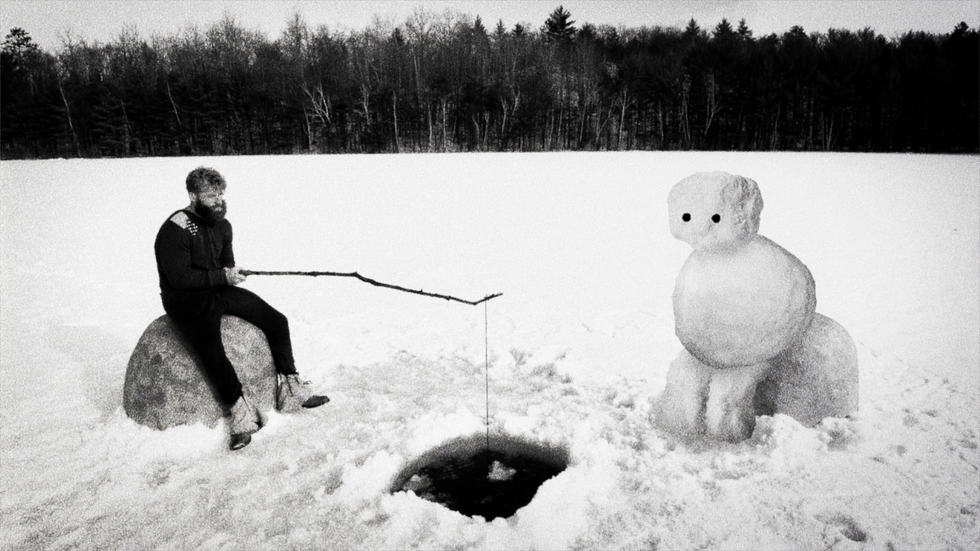'A Gray State': How Erik Nelson Unraveled a Triple Murder Conspiracy in His Herzog-Produced True Crime Doc
Director Erik Nelson calls his film 'The Shining' meets 'Grizzly Man.'

In a sea of recent true-crime docs, Erik Nelson’s A Gray State stands apart as a truly riveting psychological drama, complete with widespread conspiracy theories, political currents, and penultimate tragedy.
The story revolves around an Iraq War vet and aspiring filmmaker named David Crowley, who went from patriot to skeptic during his two tours in Iraq, and made a DIY trailer for an ambitious dystopian feature film about a not-that-far-from-reality future where the government has trampled all over civil rights and the people are in armed revolt. Unsurprisingly, this trailer spread wildly via internet conspiracy theorists and tea party activists. Suddenly, Crowley was becoming the voice of a movement and his film was poised to receive real Hollywood funding.
In the midst of production, Crowley and his wife and baby daughter were found murdered in their home with "Allu Akbar" written in blood on the wall. Needless to say, the conspiracy crowd went absolutely bananas, but extensive police investigations revealed that Crowley himself had committed the murder-suicides, and written the Allu Akbar on the wall himself in his wife’s blood.
"It's a dark ride into the dark recesses of madness, in real time, as documented by the insane person. Yeah, okay that sounds fun."
After the investigation was over, the police turned over the computers, 13,000 photographs and hundreds of hours of video they found in Crowley’s house—including the carefully crafted playlist of songs that were playing on a loop when the bodies were found—to Erik Nelson. Nelson, who has produced several of Werner Herzog’s films including Grizzly Man, painstakingly pored over the material, which consisted in large part of Crowley’s documentation of every step of making his own film. Nelson combined this with interviews of Crowley’s family and friends, and Crowley’s father reading passages of his son’s journal, to try to piece together the events leading up to the horrific crime.
The resulting documentary, A Gray State, opens in theaters this week, but No Film School spoke with Nelson the day after its world premiere at Tribeca 2017. Like the film, our far-reaching discussion delves into a world where, when we have so many tools to constantly record our
NFS: Last night was your premiere, and the audience seemed shocked by the film, but they all stayed for the Q&A and wanted to know more.
Nelson: I said that when we're done with the first screening there's going to be dead silence in the audience. No one's going to know even to applaud and audiences will look like they were hit in the head with a ball peen hammer.
NFS: Right, you were right.
Nelson: I get it. It's unbelievably dark. It's transgressional if you look at it from the right angle. It's a dark ride into the dark recesses of madness, in real time, as documented by the insane person. Yeah, okay that sounds fun.
NFS: The Q&A also seemed emotional for you. Why was that?
Nelson: The reason we did the movie is the family was trying to connect with the truth. Or an explanation about what happened. I was able to offer my services to help that connection and bring along the New Yorker magazine in [reporter] Alec Wilkinson as a journalist. We brought in a psychiatrist who went through all the material and met the family to go through his findings. That never was in the film but it informed our journey.
If you think about it, we spent an awful lot of money to do the investigation. When people say, "Well why would the family do [the film]?" It was because I honestly offered those services. I told them at the very beginning, "You are never going to like this film. You're never going to be comfortable with this film but I'll do the best I can to tell it as truthfully as possible." To be blunt, the only audience that really matters to me is the people who trusted me to make the movie.
I don’t know why I got emotional at the screening. This film gets to you. The reporter said, "There's something about this, you can't wash it off." I think just the emotion of having so many of the people there, and knowing the family's there. This is the first an audience has seen of this thing we've been working on for two years.

NFS: What is relationship between this film and Grizzly Man? Both are made with found footage, contain violence, and have Werner Herzog’s involvement.
Nelson: I think if my goal was to transcend what I did with Grizzly Man, in finding that material and Herzog to tell the story properly, this film did it. Of course, this film has an unspeakable crime at the heart of it.
The thing I missed was not having Werner be able to tell the story. Werner has a brand, Werner has a worldview, and the whole trick of Grizzly Man is balancing Werner's bleak, Herzogian view of nature and [protagonist] Treadwell's. It was a duel between their perspectives. Then Werner gives Treadwell the last word in the film. There's a lot of me in that structure.
Going in with this, that's why the dog’s at the ending. It's funny because people says it's Herzogian. No, that was always something I wanted. That was one of the first things I knew was going to end the film. I began at the end, it never changed. Just seeing the dog as a runt throughout this footage and knowing that the dog survived. It always seemed like the thing to do.
I had cut the sequence and I had the song fall behind [from the playlist that Crowley created to accompany the murder-suicide]. That wasn't the only song playing but it was the song in the police picture. I actually reconstructed his playlist. I have a playlist with all 53 songs.
NFS: Oh, that's creepy.
Nelson: I had it on my computer. I would play that as background as we were making the film.
"Because there's a child involved, because there's two innocent victims, I was always worried what I would find."
NFS: How was it different combing through this footage than it was the Grizzly Man footage?
Nelson: Well the footage of Treadwell was one guy in spectacular nature. It didn't have the psychological aspect. It was way less harrowing. Yes ,there was an audio tape that Werner heard that I never heard of the actual him being ripped apart by bears.
Here, because there's a child involved, because there's two innocent victims, I was always worried what I would find. The weight of when a child was added to the equation and we're starting with an absolutely transgressional, doesn't-get-worse crime. You're talking about opening up Pandora's box. I spent two years with it.
People would say, "Well why are you making this movie?” I said, "Really it's a cautionary tale.” There's different kinds of insidious domestic abuse out there. It's not just physical. If you're living with someone who creates this powerful, incredible, articulate worldview as as David Crowley did. He picked at his wife, picked at her. I don't think we'll ever know what went on between them.
There's absolutely no way this happens without the two of them. She's disconnecting from the friends. It's clearly this strange sort of psychological minuet that we document. We can only take it so far because they stopped recording. From the filmmaking standpoint, we had two months with nothing to show.
NFS: You had so much material. I understand it was in police custody and then it went to the family? What was the process of actually getting your hands on it?
Nelson: The chronology is, the deaths are on December 25th. The bodies are discovered January 19th of 2015. Everything is sealed up. All the evidence goes to the police. It sits, it takes a full year for them to mull through things. Then they released all the material to the family.
I was on the story within a week. Just like Grizzly Man. I was on Grizzly Man three days after Treadwell's death. I was on this immediately. Just as vehemently, because I knew there was something there. I waited for a full year, I kept assuming this was going to be a huge story. That there was going to be a bidding war with documentary makers. Everybody was going to be going after this and it was going to break huge. I kept waiting and it never broke.
The next year when the material came, I got the police report the day it came out. There was nothing in it, a very antiseptic report that had a lot of stuff in it but no whys in there. Just whos.
“Once you're into this story, you couldn't pull out. You had to ride it all the way home.”
Then [local TV news reporter] Tom Lyden, the little scamp, does a 10-minute brilliant piece which I excerpt from the film where he interviews everybody. I had thought I had an understanding with the family, they were not going to do any news.
I went ballistic saying, "Guys, what are you doing?" Ironically, the great thing was Lyden did a really good job. He did a terrific job of telling the story. I also didn't think he had it. When I did the interview with Tom, I was kind of casting him as the cowboy reporter without a clue, who's missing the story.
Then it turns out he’s way smarter than I was on this. Someone who'd done a story a few months back. He was just incredibly insightful. The scene where I shoot the premonition video, I had never mentioned the words, The Shining. I didn't lead my witness. When he said, "Okay, I know what you're thinking, The Shining right? Redrum, redrum." I'm like, "Yes, so you see it too?" Then Lyden basically becomes the voice of reason in the film in a way.
NFS: I was intrigued by a quote you said last night, "The film revels in untidiness." Can you talk more about that?
Nelson: Well it's just that documentary is traditionally tight conclusions. True crime docs or issue docs. No knock on Sundance, but with the films at Sundance, you kind of know where they're going and you know what they're saying. You know what people are going to take away from it.
With this film, it's untidy because it doesn't have a conclusion. It's a collection of uncomfortable moments resulting in an uncomfortable conclusion. It doesn't have a, “Look! He gets a medal at the end of the movie” moment to it.
It is designed to send people into the lobby to talk amongst themselves and reconnect with themselves and say, "We may have problems with Jesus." It's designed to take an audience to a place you usually just don't go in any movie let alone a documentary. I don't know, maybe you do. I don't see as many of them as I should. I knew going into it was going to be an extremely dark ride. Once you're into this story, you couldn't pull out. You had to ride it all the way home.

NFS: Do you worry at all that you or any of your subjects are now subject to harassment or worse from the conspiracy theorists who are obsessed with the case?
Nelson: They already are.
NFS: How do you handle that?
Nelson: If you look at the actual number of people, the guys in the movie, when they do their YouTube broadcast, 108 people watch it. There's 14 or 1500 subscribers to their page in the world. I don't think we have to worry about it that much. I've just told the family, "This film is an antidote to that. They won't accept, I'm sure, any of the conclusions because they don't want to." It's a religion, conspiracy behaves as a religion and you don't question people's belief systems. Anyone who thinks this will change anyone's mind, nope.
NFS: Did you have any reason to disagree with the police findings?
Nelson: No, there was no reason not to agree with police findings. No. There's a couple of open-ended questions I have. Just on some of the forensics of the thing, but no. It's clear what happened. The conspiracy theorists point to, a glass door wasn't shut entirely. It was left unlocked. Well, that glass door had been broken for a year. Everyone in Crowley’'s house knew about it.
There was a bullet hole in the ceiling that the police didn't find. When David fired the shot that killed him, it kept going into the ceiling. The police didn't find it. That's why there's a bullet in the ceiling. There are more shots fired, where are the other shots? Why was he shooting? He was shooting at the dog.
NFS: You have an answer for everything.
Nelson: I'm looking at the World Trade Center. I've done films on 911 truthers which got me in [conspiracy theorist] Alex Jones' gun sights. I said, "Look, how many people would be necessary to pull it off? The ninja janitors." The theory is that ninja janitors planted hundreds of thermite charges throughout the Twin Towers to make sure they collapsed.
If you start adding up the logistics of the conspiracy, it's like, “Really?” I've learned there's no point. People are entitled to their beliefs as long as they're respectful of other people's beliefs.
When they cross the line like these guys have and are accusing people of things they didn't do, then capitalizing on a crime and the grief, I think it's out of line.
They did show up, and they did turn up in the movie. I didn't put words in their mouths. I gave them something of a last word. I don't agree with them.
“There's this horrible feeling he's waiting for me to come finish the film he started.”
NFS: But, as you said yourself, there isn’t a clear conclusion to the film.
Nelson: Yeah, you watch it again and you say, "This is a film that absolutely works on repeated viewing." Even for me. I'm now noticing some of David's selfie camera work. If you look at when he's doing what we call “the demon interview,” when he's interviewing his wife after her rapture experience.
She's looking up. David is holding the camera, rolling, rock steady, 16x9 ratio. She's talking to him and he's filming this. She knows he's filming it and he's filming it. Why? Why's he filming it 16x9? What is he doing? Why is he interviewing her about her experience? What's he going to do with that? Why does he record a voice memo and get it down on tape? Where did he think this material was going to go?
What was he doing? There's this horrible feeling he's waiting for me to come finish the film he started.
NFS: Oh wow.
Nelson: You get haunted by that. You go down that road.
NFS: We are read by filmmakers, so we always ask about advice.
Nelson: Never ever make a film like Gray State, that's one piece of advice.

NFS: Well, what if they were to make a film where they inherit a bunch of footage, which happens a lot these days. Do you have any suggestions for approaching that material?
Nelson: Call me first so I can make the first crack at it, that would be the first advice. The second advice is: always tell the truth. Let the footage take you where the footage takes you. Don't impose your view upon it.
NFS: How do you avoid imposing your own view?
Nelson: Well you do the best you can.
NFS: I’m also wondering about transitioning between the producer and director roles, which a lot of us do in documentary, and you've done it here.
Nelson: It's the same job I think. My definition of a director is somebody who controls the horizontal and vertical. Who knows the intimate details of all aspects of the production. Knows the film, knows the market, knows how to get the money. Knows how to keep the people putting up the money happy. Knows how to deal with the notes from the people putting up the money and is truthful and honest with their subjects. Has a radical, a specific creative view of the project.
It's the same definition for a producer that it is for a director. I don't think there's any difference. I don't know a director who wasn't a producer. The way I've envisioned being a producer, their function, what are they supposed to do? They show up and they do some interviews and then cut something and see if you like it or not?
"At times I wish somebody else had made the movie."
NFS: Well some would argue that the director handles that, the creative vision aspects. You were talking about understanding every detail of the story.
Nelson: Yeah, but a producer is the person who says, "This is the story." In my relationship with Herzog, I found Grizzly Man, I knew it was a film. I was going to direct it myself. I also met Werner and it's a long story. When I told him about the project she said, "Well I want to direct it." I realized I could produce a good film or let him direct a great one. I also just didn't want to go in and get eaten alive by bugs in Alaska.
NFS: Fair enough.
Nelson: Cave of Forgotten Dreams was entirely my idea. It's Herzog's film entirely; there's not a frame of that film that's not Herzog. Nor is there not a frame of Grizzly Man. What I'm saying, my personal worldview, as producer, I just completely blur the lines. I always feel I'm more in the Billy Wilder category. You write, produce and direct. You control every aspect of it.
My North Star and someone I still have a project pending with the estate of is Stanley Kubrick, who did it all. He was a fantastic producer, totally understood the mechanics of how to do a film. Was absolutely a good enough writer to get it done and knew how to get what he needed out of writers. Obviously a great director. There is no blurring the lines. In my world, it's the only way.
The project Gray State couldn't have happened otherwise because the producer had to get the material and do the writes and literally negotiate the deal and a contract with the family. That ties into the creative. What's the family sensitive to? How do you get the materials? How do we get the drives? Well, then the family trusts the director because they've worked with the producer who is the same person. They trust the writer as the writer who's putting it together is also the director.
It made a project like this possible. I'm not saying no one else could have made this movie. At times I wish somebody else had made the movie.

